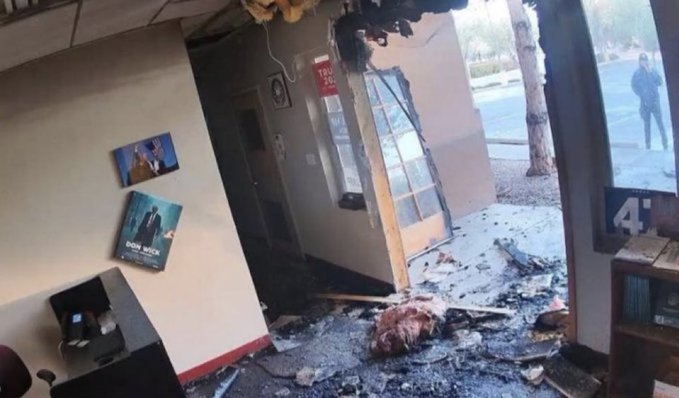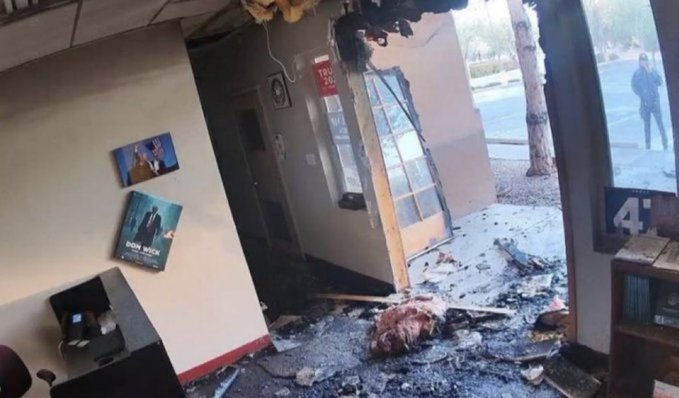GOP HQ in New Mexico Set Ablaze: Feds Investigate Domestic Terror!
Suspicious Fire at New Mexico GOP Headquarters: A Deep Dive
Early on a Sunday morning, the New Mexico Republican Party’s headquarters in Albuquerque was engulfed in flames, prompting an immediate investigation by federal agents. The incident has raised significant concerns regarding domestic terrorism, as authorities discovered “incendiary materials” at the site of the fire. This incident not only highlights the growing tension in American politics but also underscores the need for vigilance in safeguarding political institutions.
Overview of the Incident
The fire at the New Mexico GOP HQ occurred early on March 31, 2025. As reports began to surface, the Bureau of Alcohol, Tobacco, Firearms and Explosives (ATF) confirmed that evidence of incendiary devices was found at the scene. Such findings suggest that the fire may have been intentionally set, raising alarms about the potential for politically motivated violence in the United States.
Investigative Response
Following the discovery of incendiary materials, federal authorities swiftly launched an investigation to determine the cause and origin of the fire. The ATF, known for its expertise in handling cases related to explosives and arson, is leading the inquiry. The incident highlights a growing trend of politically charged violence, which has become increasingly prevalent in recent years.
The Political Climate
The fire at the GOP headquarters is not an isolated incident but rather part of a broader trend of political unrest in the country. In recent years, the United States has witnessed a rise in politically motivated violence, with various political entities becoming targets for vandalism, arson, and other destructive acts. This alarming trend has raised questions about the safety of political institutions and the individuals who participate in the democratic process.
- YOU MAY ALSO LIKE TO WATCH THIS TRENDING STORY ON YOUTUBE. Waverly Hills Hospital's Horror Story: The Most Haunted Room 502
Implications for Political Parties
The attack on the New Mexico GOP HQ underscores the vulnerabilities that political parties face in today’s polarized environment. Both major political parties have experienced acts of violence and intimidation, highlighting the need for increased security measures. The incident also raises questions about how political discourse has evolved in recent years, particularly in the context of social media’s role in shaping public opinion and mobilizing individuals to act.
Community Reaction
Local community members and political leaders have expressed their outrage and concern over the fire at the GOP headquarters. Many have condemned the act as a violation of democratic principles, emphasizing the importance of respectful political discourse. The incident has prompted rallies and discussions about the need for unity and understanding among differing political viewpoints.
The Role of Social Media
In the wake of the incident, social media platforms have played a pivotal role in disseminating information and shaping public perception. The initial report of the fire was shared widely on Twitter, with many users expressing their shock and disapproval. Social media can amplify voices, but it can also contribute to the spread of misinformation and incite violence. This duality presents challenges for both law enforcement and the general public in navigating political discourse.
Government Response
In light of the incident, governmental bodies at both the state and federal levels are likely to assess their strategies for preventing political violence. Enhanced security measures may be implemented at political headquarters and events to ensure the safety of individuals involved in the political process. Law enforcement agencies may also increase their focus on domestic terrorism and politically motivated violence, given the rising trend of such incidents.
The Road Ahead
As investigations continue, the New Mexico GOP and other political entities will need to prioritize their security and safety protocols. It is crucial for political leaders to call for calm and promote dialogue among constituents to mitigate tensions. The incident serves as a sobering reminder of the responsibilities that come with political engagement and the importance of protecting democratic institutions.
Conclusion
The suspicious fire at the New Mexico Republican Party headquarters is a significant event that underscores the current state of political unrest in the United States. With evidence pointing to potential domestic terrorism, it serves as a wake-up call for political parties, law enforcement, and the public. Addressing the root causes of political violence and fostering respectful discourse will be essential steps in ensuring a safer environment for political engagement moving forward. As the investigation unfolds, stakeholders must remain vigilant and committed to upholding the principles of democracy and civil discourse.
This incident not only highlights the challenges faced by political institutions but also calls for a collective effort to restore faith in democratic processes and promote understanding among diverse political ideologies.

GOP HQ IN NEW MEXICO TORCHED—FEDS INVESTIGATING POSSIBLE DOMESTIC TERROR
Federal agents are probing a suspicious fire that damaged the New Mexico Republican Party’s HQ early Sunday morning in Albuquerque.
ATF confirmed “incendiary materials” were found at the scene but… https://t.co/rATHADjz2R pic.twitter.com/vZg17eMZiM
— Mario Nawfal (@MarioNawfal) March 31, 2025
GOP HQ IN NEW MEXICO TORCHED—FEDS INVESTIGATING POSSIBLE DOMESTIC TERROR
If you’ve been keeping an eye on the news lately, you might have come across a rather alarming story. A suspicious fire broke out at the New Mexico Republican Party’s headquarters in Albuquerque early Sunday morning. Federal agents are now looking into this incident as a potential case of domestic terror. Let’s break down what we know about this incident and its implications.
What Happened at the GOP HQ in New Mexico?
In the early hours of a Sunday morning, the GOP headquarters in Albuquerque became the scene of a suspicious fire. Eyewitnesses reported seeing flames engulfing the building, prompting immediate action from local fire departments. The fire was serious enough to cause significant damage, drawing the attention of federal investigators. The Bureau of Alcohol, Tobacco, Firearms, and Explosives (ATF) has since confirmed that “incendiary materials” were found at the scene, raising concerns about the nature of the fire.
This incident is alarming not just for the local Republican Party but for the broader political landscape in the United States. Political headquarters are often seen as symbols of party strength, and an attack like this could have far-reaching consequences.
Understanding Domestic Terrorism
When we talk about domestic terrorism, it’s important to understand what we mean. Domestic terrorism refers to violent acts committed by individuals or groups against their own country, often motivated by political or ideological beliefs. The FBI defines it as incidents occurring within the U.S. that are conducted by U.S. citizens or residents. The motives can vary widely, from political disenfranchisement to radical beliefs, making it a complex issue that requires careful examination.
In the case of the GOP HQ fire, the presence of incendiary materials suggests that this was not merely an accident. The ATF’s involvement underscores the seriousness of the situation. Federal agents are tasked with investigating any potential links to organized groups or broader movements that may have inspired this act.
The Political Climate in New Mexico
New Mexico has long been a battleground for political ideologies, with a blend of Democratic and Republican influences shaping its landscape. The state has seen its fair share of political tensions, particularly in recent years. With the rise of polarized political views, incidents like the fire at the GOP HQ can exacerbate existing divisions within communities.
In light of this incident, many are questioning what it means for the future of political discourse in the state. Will it lead to increased security measures at political events? Could it further drive a wedge between opposing parties? The ramifications of such violence can ripple through communities, affecting not just political affiliations but also personal relationships.
Public Reaction to the Incident
Naturally, the fire at the GOP HQ has sparked a wide range of reactions from the public and political leaders alike. Many Republicans are understandably outraged, viewing the attack as an assault on their party and its values. On social media, words like “terrorism” and “attack on democracy” are being thrown around, reflecting the gravity of the situation.
Conversely, some individuals have expressed concern over political rhetoric that might incite violence. In a world where social media plays a significant role in shaping public opinion, the way leaders respond to such incidents can have a profound effect on the dialogue surrounding political activism and violence.
The Role of Social Media in Shaping Perceptions
Let’s face it, social media has completely transformed how we consume news and engage with political discussions. In the wake of the fire at the GOP HQ, platforms like Twitter and Facebook have become hotbeds for opinions, theories, and even misinformation. The rapid spread of information can amplify fears, sometimes leading to overreactions or misguided conclusions about the situation.
For instance, a tweet from Mario Nawfal highlighted the seriousness of the incident, drawing attention to the federal investigation. Such posts can shape public perception, sometimes causing panic or fear that might not be warranted. It’s crucial for individuals to approach information critically, especially in sensitive situations like this one.
The Investigation: What’s Next?
As the investigation unfolds, many are left wondering what the next steps will be. The ATF’s involvement indicates that federal agents will be conducting a thorough examination of the scene and gathering evidence to identify the perpetrators. This could involve interviewing witnesses, reviewing surveillance footage, and analyzing the incendiary materials found at the site.
Additionally, it’s possible that this investigation could lead to broader discussions about security and safety in political spaces. Are current measures enough to protect party headquarters and events? Are there vulnerabilities that need to be addressed? These questions may arise as officials work to ensure that such incidents do not happen again in the future.
The Broader Implications of Political Violence
Political violence is not just a local issue; it can have national implications. Incidents like the fire at the GOP HQ can spark debates about the state of democracy, civil discourse, and the safety of public spaces. As political tensions continue to rise across the country, it’s vital for leaders on all sides to engage in constructive dialogue rather than resorting to violence.
In times of political unrest, it’s easy to become entrenched in one’s beliefs and lose sight of the broader picture. We must remember that political violence harms not just the targeted individuals or groups, but also undermines the very principles of democracy that we hold dear.
What Can We Do Moving Forward?
As citizens, we have a role to play in shaping the future of political discourse. Supporting initiatives that promote dialogue and understanding between differing viewpoints can contribute to a healthier political environment. Engaging in community discussions, attending town hall meetings, and advocating for peace are all ways to defuse tensions and build bridges.
Furthermore, individuals can educate themselves about the principles of democracy and civic engagement. Understanding the importance of constructive debate can empower citizens to voice their opinions without resorting to violence or intimidation.
In the aftermath of the fire at the GOP HQ, let’s take a moment to reflect on the consequences of political violence and consider how we can contribute to a more peaceful political landscape.
As this story develops, it will be interesting to see how it influences political conversations, safety protocols, and community relations in New Mexico and beyond. The investigation is still ongoing, and we can only hope that the findings will lead to accountability and a commitment to preventing such incidents in the future.

